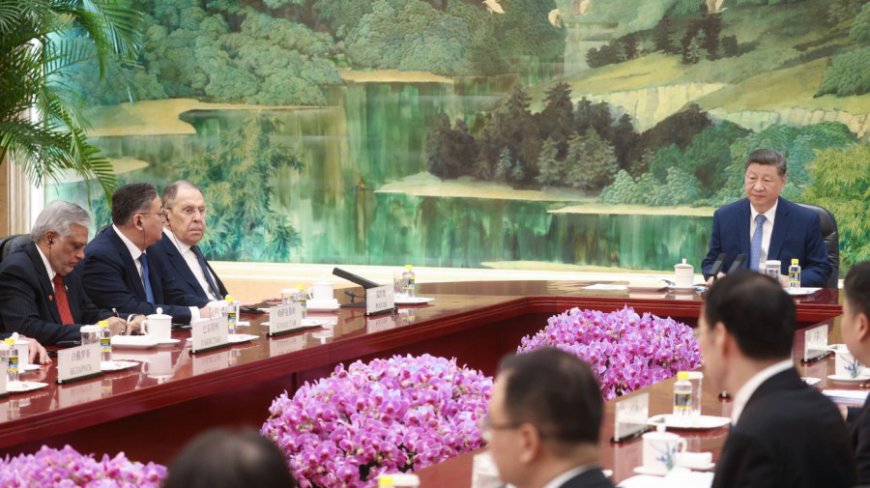China’s nuclear weapons ploy is a war signal from Xi
Given significant war preparations, it’s unlikely Beijing’s willingness to sign the protocol to the Bangkok Treaty is the result of peaceful intentions.

On July 3, China’s foreign ministry signaled that Beijing would sign the protocol to the Southeast Asia Nuclear Weapon-Free Zone Treaty, or Bangkok Treaty of 1995.
Russia is also ready to ink the protocol according to sources. Some believe the U.S. is also considering doing so.
Beijing and Moscow suddenly deciding to sign the protocol is not an indication that peace is breaking out in that volatile portion of the world. On the contrary, the willingness to join looks like a war signal.
“As [the Association of South East Asian Nations'] comprehensive strategic partner and friendly neighbor, China firmly supports establishing the Southeast Asia Nuclear Weapon-Free Zone,” said Mao Ning, Chinese foreign ministry spokesperson, at her regular press conference. “We have said more than once that China is ready to take the lead in signing the protocol to the SEANWFZ Treaty. We will maintain communication with ASEAN countries on this matter.”
The Bangkok Treaty is a pact signed by all 10 members of the Association of Southeast Asian Nations. The treaty, according to the association, is “a commitment to preserve the Southeast Asian region as a region free of nuclear and other weapons of mass destruction.”
Moreover, through the treaty, the Association of Southeast Asian Nations “reaffirms the importance” of the Treaty on the Non-Proliferation of Nuclear Weapons.
The treaty established the world’s third nuclear weapons-free zone. There are now five in total. The other zones cover Latin America and the Caribbean, the South Pacific, Africa and Central Asia.
It also includes a protocol designed to be signed by the five states permitted by the non-proliferation treaty to possess nuclear weapons. The protocol, among other things, prohibits the use or threats to use nuclear weapons in the zone. So far, none of the five nuclear weapons states has signed on.
So what’s the harm in a nuclear weapons state signing the protocol?
“China and Russia had previously proposed a nuclear weapon-free zone for the Middle East to pressure Israel to give up its nuclear forces and to prevent the U.S. from deploying such weapons in the area,” Peter Huessy of the National Institute for Deterrence Studies told me this month. “Now, Beijing and Moscow are playing the same game in Southeast Asia, which would make the area free for them to deploy surreptitiously their own nuclear forces.”
After Beijing’s July 3 announcement, Richard Fisher of the International Assessment and Strategy Center told me: “The only reason for the Chinese Communist Party to sign the [protocol] is that it is getting closer to using or threatening to use nuclear weapons against Taiwan or the Philippines.”
“The treaty provides no real protection from Chinese nuclear weapons, but it would forbid U.S.-ally Philippines from permitting America to base nuclear weapons on its territory for the purpose of deterring or defeating a Chinese nuclear attack or an actual Chinese invasion of the Philippine island of Palawan, a threat for which Manila and Washington have been preparing,” said Fisher.
“As China gets closer to its war to destroy democracy in Taiwan, it wants to use the nuclear weapon-free zone to prevent the U.S. from deploying these weapons to defend that island republic too.”
Fisher pointed out that China, with its ballistic missile submarines alone, will have, according to his median estimate, somewhere between 216 to 720 nuclear warheads “on Southeast Asia’s doorstep” by 2035.
“It’s not clear to me how a country undertaking the largest nuclear arms build-up has the gall to push a nuclear-free zone treaty when it’s busy deploying seaborne nuclear weapons all over the place,” said Huessy, who is also president of GeoStrategic Analysis.
As both Huessy and Fisher noted, China has long been planning to wage war in East Asia. For instance, Xi Jinping has been issuing bellicose rhetoric lately. His favorite phrase these days is “dare to fight.”
He is doing more than just talking, however. Xi is engaged in the fastest military buildup since World War II. He has also been sanctions-proof his regime, stockpiling grain and other commodities, firing uniformed officers opposed to going to war and calling up reservists and mobilizing civilians for battle.
Given significant war preparations, it’s unlikely Beijing’s willingness to sign the protocol to the Bangkok Treaty is the result of peaceful intentions.
There is also a larger issue involving China’s compliance with treaty obligations. Take Beijing’s core promise not to spread nuclear weapons technology. Beginning in the 1970s, China proliferated that technology to Pakistan. As Huessy pointed out, Pakistan, through the A.Q. Khan black-market ring, then merchandised the Chinese tech to North Korea, Iran, Iraq and Libya.
So why should the international community trust Beijing to honor the protocol when it violated its obligation to not proliferate nuclear weapons?
In reality, treaties with China are one-way. Beijing expects others to honor their promises while it feels free to violate its obligations. So let Beijing and Moscow sign the protocol to the Bangkok Treaty, but the United States should not do so.
Countries in the region rely on the American “nuclear umbrella,” Washington’s guarantee to use its most destructive weapons to protect them from attack. This is no time to call into question this critical commitment for U.S. friends and partners throughout East Asia.
Gordon G. Chang is the author of “Plan Red: China’s Project to Destroy America” and The Coming Collapse of China.”
What's Your Reaction?























